Kathleen Jones's Blog, page 57
March 10, 2013
Pearls: A Story for Mothers' Day
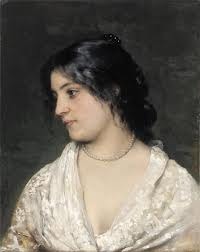
It's three months now since Jack Farrar left for America. His brother wrote to say that there was good work to be had in New York and no one cared where you said your Sunday prayers, so as soon as Jack got his half year pay he was off. 'Come with me,' he said. But how could I, placed as I am? And he has been much missed. We’ve been good company since he came to work here two years ago from his lordship's Killarney estates, having fallen out with the steward there.
Jack was not approved here either, though he worked hard. I heard Mr Lines tell him that he served with a bad grace and should show more gratitude, though what Jack should have been grateful for he didn't say. Jack made some retort I couldn't hear and Mr Lines rebuked him in a tight voice, saying that he should keep his politics to himself.
Jack gave me some hard words too before he left. 'You're a fool Katy,' he told me, 'Save yourself while you still can, for no-one else will. Not almighty God and certainly not that bag of shite on his gilded throne upstairs.'
His lordship's not a bad man, I think, but just what men are, and as much a slave of what he was born to as Jack Farrar. And not as free, for he can't take ship and sail away from his great estates and his many relations and their demands. For myself, if I had his advantages, I would get rid of the Lady Margaret, but he dotes on his mother more than he does his wife, who is a pale, limp thing with more pedigree than purpose. This phrase, springing so readily to my mind, gives me a pang, for it is stable-talk and one of Jack's expressions.
~~~~~~~~~~~~~~~~~~~~~~~~~~~~~
Vanity is a venial sin, but in the cracked mirror above the chest of drawers, when I take off my shift to go to bed, I am sometimes tempted to look at my breasts and hold the weight of them in my cupped hands. They're swollen now, veined with blue, the nipples dark and thick as thumbs. I can feel my breasts ache at the thought of his soft fingers at my bodice, his tongue's flutter against the hard nipple. A drop of milk oozes from one breast at the memory of it and hangs from the teat like a small pearl - the jewel that is both my shame and my keep. It purchases the fine linen shift I put over my head and the Indian muslins I wear in summer weather, that are the envy of the laundry maid. I dine well, for I must eat for two and his lordship's child must not go hungry. For the same reason I am fed from my lady's table and - because I am not fit to dine with her - I take my trays in my room. Last night it was potted trout and roast chicken with a baked custard to follow. I ate, I'll wager, more than she did, for her face is as thin as a twelve year old girl and her wrists like wish-bones.
When she was heavy with the child, she glowed with her own importance - pampered, fed by her husband's hand. The same fingers that stroked my breasts, plucked grapes and peeled apricots for her as she lay on the sofa, her cheeks flushed, her eyes full of light, her hair a glossy brown coil. And when I was laid low with disgrace, she was proud and joyous from the same cause. Our fates have stayed in equal opposition since.
I buried my daughter in the same month she was born and now it is my lady's child that I hold in my arms - her son whose eyes hold mine, who tugs on the nipple and then slackens his grip to smile at me with dark eyes like his father's. And when he sucks, with such a strong pull, I feel that sweet ache in my stomach that is so sinful a girl can lose her virtue for it.
~~~~~~~~~~~~~~~~~~~~~~~~~~~
There are still those who say the child was Jack's, but he has never touched me. All we ever did was talk, and - though it would seem strange to others - that conversation was of more importance to me than anything I have ever done with another.
~~~~~~~~~~~~~~~~~~~~~~~~~~~~
My mistress visits my room sometimes, coming through the door hesitantly as if needing permission and then sitting silently on the hard chair beneath the window to watch. She had begged, they say, to suckle her own child, but the Lady Margaret forbade it. Only peasant women stoop so low; a fine lady must not behave like a cow or a goat - her body must be a thing of beauty, reserved for her husband's pleasure. So I nurse her child, his tiny fingers curled round mine, his face gazing into mine and it is my blood that feeds him, flesh of my flesh that he becomes day after day, as he grows fat with my good milk. If it were me in that chair, I could not sit so still; I would claw my child from the arms of any woman who held him.
They tell me I had to be pulled from throwing myself into the grave with my own babe, though I do not remember much of it now. The priest said it was more a sin to embrace death of my own will than it was to have a child out of wedlock.
But no drop of family milk must be wasted. The Lady Margaret came herself to fetch me from the nuns, for the woman they had engaged to nurse proved dry and their son and heir was crying night and day. At first I could not bear to think of another's baby at my breast while my own daughter lay cold in her swaddling bands, but, when I heard the child sobbing, my swollen, tender, traitorous breasts dripped milk of their own accord, soaking the front of my gown as I stood there, and I could see my Lady Margaret smile.
They were cruel, those first days - the child's greedy sucking hour after hour, my breasts engorged and my nipples so sore I couldn't bear even the touch of my clothes against them. And in my heart - that pain was worse to suffer.
Once, nursing the babe beside the fire, I looked down at him drawing hard on the teat in spite of my agony and it was all I could do not to throw him in the flames and run out into the night. Why should her child live and mine perish? The feeling was so urgent that I must get up and walk away to the end of the room, clutching the child to me, my legs trembling and my stomach weak. I must be very sinful to fall so low and have such wicked thoughts.
I once heard my lady talking to her husband about the moral danger of my employment - that the child might imbibe my moral laxity with the milk. Little does she know that the blessed babe suckles at the same teat as his father did, though the Lady Margaret is not so stupid. And it is not only my morals they fear he might swallow, but my religion also. I have not taken mass or made my confession since I returned here. The priest asks to see me when he comes to the servants' hall for his fish supper on a Friday night, but he is forbidden to come upstairs. Which is a blessing since I have little taste for priests these days.
~~~~~~~~~~~~~~~~~~~~~~~~
It's the night feeds that are the best, when the house is still and the babe warm against my stomach, his dark head in the crook of my elbow. I can feel his breath on my skin as he sucks and I am drowsy with pleasure. Just the babe and I in the darkness beyond the yellow circle of the candle flame. They make me leave the door ajar so that they can be sure I don't take him to bed and overlay him, though the old nurse snoring in her bed next door would never know, she sleeps so deep.
In the beginning when the child cried, the Lady Margaret used to appear suddenly, her cap strings dangling, and her candle held high so's not to drip wax on her robe of red brocade, and she would stand in the doorway and watch me settle him before padding back down the stairs to her own room. She does not come now, but sometimes I can sense a presence in the darkness and I know that someone else is watching through the gap in the door. It must be, I think, a touching picture. I am the Madonna of the night - a girl with loose hair in a cotton shift, unbuttoned, suckling a seven month child. But when he is back in his crib, it is not the babe who is in danger of being overlaid, and I am full of fear, for there are some sins too terrible to be forgiven.
~~~~~~~~~~~~~~~~~~~~~~~~~~~~
The mistress came again today to watch me feed her son. Her face grows thinner as her belly swells. Her eyes, like her hair, are dull. Today she told me that she is mortally afraid of another confinement. I could see that she did not mean to tell me and was sorry straight away. Such confidences are meant for woman friends, not servants.
'I almost died having him,' she said, by way of excuse. 'He was such a big baby and I'm so small.'
'You'll be just fine,' I said. 'Don't you have the best doctors? And a lying-in nurse from London?' I tried to keep the bitterness out of my voice, remembering my own birthing, left in the straw to manage as best I could by myself, taking Eve's punishment for her sin. But what would my lady know of that?
'I feel so pulled down. If only I'd been given more time ....... ' She lowered her head and chewed her lips, having said too much. But she's right, he must have had her on her back between the sheets before the monthly nurse had boarded the Liverpool ferry. And there will be another child for me to feed before this one is weaned.
~~~~~~~~~~~~~~~~~~~~~~~~~~~
Some nights if the child is slow to go down, I take my candle and go walking with him through the silent house. My bare feet make no more noise on their thick carpets than the housekeeper's cat. And I wander through the rooms I am forbidden by day, the little lordship on my shoulder, showing him his inheritance. I know every corner of these grand rooms, every lacquered table, every porcelain bowl and silver sconce, for wasn't it me that polished and dusted them in another life? I know something of the paintings too, the sombre ancestors in their elaborate frames - people that only Mr Lines can put a name to, his family having been stewards here for three generations. And there are women in silks and ribbons with long noses and powdered hair three feet high in the manner of the unfortunate French Queen. The Lady Margaret is one of them, with a strange affair of flowers and feathers perched on top of her wig and an indecent amount of flesh over the top of her bodice. She does not look like that now.
In the gallery at the top of the stairs is the painting his lordship brings everyone to see, for it is Italian, brought back by his grandfather from the grand tour. When I first came here it was not to my taste, for it reminded me of the church; a sour-faced Madonna with an oversized child at her breast and a landscape of rocky shores and sailing ships over her shoulders. Now, as I stand there, holding up my candle, with the child growing hot and sleepy against my neck, I think that perhaps she is sad. There is something in her eyes as she looks at her infant that any mother would know.
When the library door is closed I don't go in. But some nights, if it's unlocked, I push it open and walk inside. It smells of himself - a cold, sharp smell like water thrown on a peat fire to damp it down, and the scent of the tobacco which he keeps in blue porcelain jars on the corner of the desk. I run my finger over the leather spines of the books, and sometimes, if I take a fancy to the title, I borrow one of them, for I can read at least better than her ladyship. My mother taught me that.
When they are away in Dublin I sometimes take the key from the drawer where he hides it, pull aside the shelf of almanacs and open the safe where he keeps his private papers and my lady's jewels. I like to open the boxes and try them in the mirror. This case of red morocco holds the diamonds he bought her when the child was born, which she is very proud of, though they are not to my taste, for they are hard and cold against the skin. And this is the collar of sapphires, blue as the Madonna's gown, that was the Lady Margaret's wedding gift. He let me try it once, when my lady was visiting her mother and he gave me a glass of Spanish wine in front of the fire, loosening my bodice and fastening the gems around my neck. They looked very pretty in the mirror, glinting in the firelight. But my favourites are the pearls, nested in blue velvet, a thick strand, given to my lady as a birthday gift before they were married, and which she does not like. She will wear neither pearls nor rubies, he told me, for they signify blood and tears. The pearls lie warm around my throat, the colour of milk.
'They become you,' he said, putting his hand on my shoulder and lifting my hair to caress my neck. If my child was a son, he told me, he would see me right. But he made no promises for a girl.
~~~~~~~~~~~~~~~~~~~~~~~~~
My mother worked here once - 'An excellent domestic,' Mr Lines called her - but she left when I was born and went to keep house for the priest. Of my father she never spoke - it was a question that could not be asked. And when she died of a wasting sickness when I was but eleven, the Lady Margaret sent Mr Lines' wife to fetch me here in memory of my mother, though it is not the life my mother wanted for me. To hear my mother talk, this house was Babylon and the Lady Margaret the great Queen Jezebel herself. She would rather have burned in hell than see me walk through its gates. I could not see, when I first came, what it was she hated so, but five years later when I walked down the drive with his lordship's child in my belly and no character but the one I'd made for myself, I understood better.
~~~~~~~~~~~~~~~~~~~~~~~~~~~
This morning when I got out of bed my stomach was so disordered I sent my breakfast back uneaten - an event so original even the kitchen maid remarked on it when she came to take my tray. I have been nauseous all day, but more with anxiety than sickness. This is the third occasion in a week and I greatly fear the cause of it. Every woman knows you can't be caught while you are feeding. But could it be? I have seen no monthly blood since my daughter's birth, so there is no other sign to guide me. But now this thought is in my mind. If it happens tomorrow I must give my breakfast to the dogs or the servants' hall will have it for a fact.
After I had fed the child and given him to his nurse I went for a walk through the gardens down to the river, not caring who saw me go. It was a good day, with flying cloud and a bit of sun to warm the wind. I had Jack Farrar's letter in my pocket. He has a good job already, labouring on a bridge - he says New York is all building and there are plenty of openings even for a woman. He is lodging with another Irish woman called Mary Hogan who can neither read nor white. I could get good trade, Jack says, in penning letters for the people here, and there are those who would pay just to learn their ABC. And there is other, more humble employment in keeping the men fed and their clothes clean. 'The work is hard, but honest, and your soul is your own. Will you not come?' Jack writes.
The surface of the river puckers as a salmon rises to a fly that has flown too near the surface. I can see my future in front of me very clear. If I am not caught now, then I will be again, for I cannot get free of him as long as I am here. And then I will be at the mercy of the priests who will put my child in the orphan house and me to work in the convent laundry. I have had a taste of it and will not go there again, but I am so mired in sin I do not know how to get out.
~~~~~~~~~~~~~~~~~~~~~~~~~
It has been more than a week since Jack's letter and I haven't stopped thinking about how it might be managed. Then yesterday my lady had a whim to go up to Dublin to buy some new linen for her lying in. His lordship never passes the chance to spend time and money in the city, so he must go too, and I could scarcely believe my fortune when the Lady Margaret said that she would go with them to see her sister.
So tonight the house is empty and everyone asleep but me. I waited until the clock chimed ten and I heard Mr Lines lock the front door. Then I went down to take the pearls from the safe. When I turned the key and pulled the door open, there was a leather pouch just at the front, which almost fell out, as if it had been pushed in hurriedly. When I peered inside there were the sovereigns his lordship had got from Lord Annesley two days ago for a mare. I took four of them and, together with the pearls, became a common thief. But such thievery is a small thing in the list of sins I have committed. And I must not think of it as stealing. These coins are my wages, rightfully due, and will buy me a passage to America. And the pearls I will think of as a present from his lordship, to 'see me right' in my new life. I can sell them one by one if I have the need to, and if not I shall keep them as an heirloom.
But as I was taking the pearls from the safe I heard footsteps in the hallway and straight put out the candle and swung the shelf to and slipped down onto the floor behind his lordship's chair. The steps came closer and then I heard the door open and a pool of light spilled across the carpet. I could see by the old black shoes poking from under the hem of the brown woolsey, that it was Mrs Lines and knew then that my fortune had not changed and all my plans must miscarry. She held the candle high, staying very quiet for a moment as if to listen. My heart was thundering in my breast, my breathing very fast, and it seemed impossible for her not to hear it, or to smell the smoke from the candle wick. She advanced two steps into the room, so that I knew I was undone.
But then she stopped and turned and went out again, closing the door behind her. I was praying, do not lock it, I pray you, do not turn the key! And, thanks be to whatever gods watch over thieves and fornicators, it stayed on the inside of the door and I heard her feet going down the corridor and then the quiet thud of the baize door. My legs shook so much I could hardly stand up and my hands trembled so that I fumbled the key in the safe and made so much noise putting it in the drawer, I thought it must surely fetch her back.
The child was stirring when I came upstairs and I picked him up and put him to my breast, still shaking from the fright. He smiled at me, such a sweet smile as I put him down in the crib, that I was provoked to a storm of weeping and almost persuaded to change my mind. I am calmer now, having put my best clothes in a bag and sewn the pearls into my bodice. I will wait until midnight and then slip out of the side door. I can walk fast and by morning, when the child wakes, I will be well along the Dublin road, beyond the reach of anyone who knows me, and can hitch a ride on a wagon going north to Belfast. I will tell the carrier I have been turned off by my employer and am going to my sister in Larne. The babe will cry and cry for me, but I must not think of that now, or of his dear face at the breast. For I know for certain that I will never feed another child of hers.
~~~~~~~~~~~~~~~~~~~~~~~~~
© Kathleen Jones 2013
More Fiction by Kathleen:
The Sun's Companion - historical novel
Three - short fiction, Amazon Triplet
Traffic
Painting possibly by Eugene de Blaas
Published on March 10, 2013 04:54
March 8, 2013
Back to a very Italian Reality
So here I am back in a politically confused Italy, where comedians, rather than politicians, have been calling the shots. Many people I know voted for Beppe Grillo - a famous TV satirical comedian - in a protest against the establishment and in the hope of bringing down the corrupt and unworkable system. The result is that a comedian holds the balance of power here! It couldn't get crazier.
I am jet-lagged - wake up each morning with a hangover without the night-before party to compensate. There are three suitcases of dirty washing and it's been raining non-stop for three days. But I'm not complaining. In Cambodia my email was hacked, my Facebook account was hacked, my bank cards stopped, and I had a scary experience with third world medical facilities. I'm still trying to straighten it all out. And I feel rather like the guy with the suitcases on the carnival float.
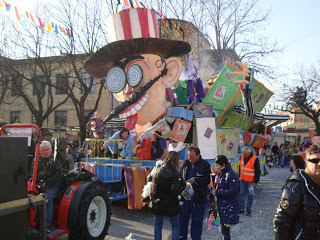
We arrived back in the middle of the Pietrasanta carnival afternoon. It's a small community affair, unlike the big international carnival at Viareggio, but we enjoyed an hour or so among the floats before heading for the supermarket. It's good to be back, even in the rain. Italy, crazy, crazy Italy, has begun to feel like home.
I am jet-lagged - wake up each morning with a hangover without the night-before party to compensate. There are three suitcases of dirty washing and it's been raining non-stop for three days. But I'm not complaining. In Cambodia my email was hacked, my Facebook account was hacked, my bank cards stopped, and I had a scary experience with third world medical facilities. I'm still trying to straighten it all out. And I feel rather like the guy with the suitcases on the carnival float.

We arrived back in the middle of the Pietrasanta carnival afternoon. It's a small community affair, unlike the big international carnival at Viareggio, but we enjoyed an hour or so among the floats before heading for the supermarket. It's good to be back, even in the rain. Italy, crazy, crazy Italy, has begun to feel like home.
Published on March 08, 2013 06:59
March 4, 2013
Tuesday Poem: Meeting the Tuesday Poets
Not a poem - just a journey and some good meetings at the end of it. I've been a member of the Tuesday Poets for a few years now, but the only poets I knew face to face were Tim Jones and Mary McCallum - met on previous visits to New Zealand. So this time I was determined to put faces to as many names as possible. In Christchurch I met two poets I'd exchanged emails with and whose poems I'd featured on my blog, Catherine Fitchett and Helen Lowe. Sadly, Andrew Bell was away and couldn't make the meeting. Catherine is a fine poet whose work
you can read here
.
Helen Lowe
is also an internationally award winning fantasy novelist. It was difficult to find a bar accessible to all of us, in quake-riven Christchurch, but eventually we all made it, through traffic diversions and rush-hour jams. The earthquakes have changed CC dwellers social lives forever.
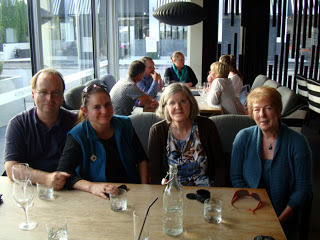 Helen Lowe and her partner Andrew, Catherine Fitchett and Kathleen
Helen Lowe and her partner Andrew, Catherine Fitchett and Kathleen
In Dunedin I met Orchid Tierney and Claire Beynon. Orchid's studying Digital Poetics - a course that's taking her to America shortly and is currently putting together an anthology called 'Mapping Me: A Landscape of Women's Stories' in collaboration with a Russian Armenian writer. Claire is also a visual artist (as you can see from her astonishing website) and I was very sad that my visit to Dunedin was so brief and there wouldn't be time to see any of her work.
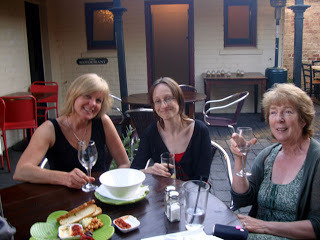 Claire, Orchid and Kathleen In Wellington we had a very convivial evening in the library bar - a lovely combination of alcohol and books! - meeting Tim and Mary again, but also Janis Freegard, Helen Rickerby, and Harvey Molloy. Tim blogs at
Books in the Trees
and has a recent anthology Men Briefly Explained, which I like a lot. He also writes speculative fiction. They're a multi-talented lot these Tuesday Poets!
Mary McCallum
also writes fiction - her novel The Blue was published by Penguin and attracted some wonderful reviews. Her current blog today features Janis Freegard, who I met for the first time and who has a new collection out called The Continuing Adventures of Alice Spider.
Helen Rickerby
isn't just a poet, she's also the managing editor of Seraph Press and JAAM magazine - oh, and she has a day job as well. She won my heart posting a poem called 'Partying with Katherine Mansfield' over the weekend of the Mansfield conference in Wellington - another KM fan. Harvey Molloy is a teacher as well as a very good poet - you can find his
Notebook here
. Again, not enough time to talk to anyone properly.
Claire, Orchid and Kathleen In Wellington we had a very convivial evening in the library bar - a lovely combination of alcohol and books! - meeting Tim and Mary again, but also Janis Freegard, Helen Rickerby, and Harvey Molloy. Tim blogs at
Books in the Trees
and has a recent anthology Men Briefly Explained, which I like a lot. He also writes speculative fiction. They're a multi-talented lot these Tuesday Poets!
Mary McCallum
also writes fiction - her novel The Blue was published by Penguin and attracted some wonderful reviews. Her current blog today features Janis Freegard, who I met for the first time and who has a new collection out called The Continuing Adventures of Alice Spider.
Helen Rickerby
isn't just a poet, she's also the managing editor of Seraph Press and JAAM magazine - oh, and she has a day job as well. She won my heart posting a poem called 'Partying with Katherine Mansfield' over the weekend of the Mansfield conference in Wellington - another KM fan. Harvey Molloy is a teacher as well as a very good poet - you can find his
Notebook here
. Again, not enough time to talk to anyone properly.
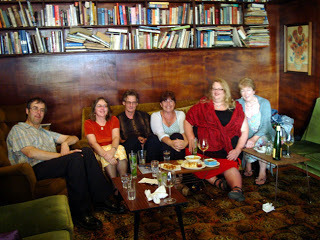 Tim, Janis, Harvey, Mary, Helen and KathleenBut at least I know a little more about some of the people who post the poems on the blog every Tuesday. A group I'm very happy to belong to. And maybe one of these days I'll get to meet the others - in Australia, or America - there are even a couple in the UK I haven't met yet.
Tim, Janis, Harvey, Mary, Helen and KathleenBut at least I know a little more about some of the people who post the poems on the blog every Tuesday. A group I'm very happy to belong to. And maybe one of these days I'll get to meet the others - in Australia, or America - there are even a couple in the UK I haven't met yet.
 Helen Lowe and her partner Andrew, Catherine Fitchett and Kathleen
Helen Lowe and her partner Andrew, Catherine Fitchett and KathleenIn Dunedin I met Orchid Tierney and Claire Beynon. Orchid's studying Digital Poetics - a course that's taking her to America shortly and is currently putting together an anthology called 'Mapping Me: A Landscape of Women's Stories' in collaboration with a Russian Armenian writer. Claire is also a visual artist (as you can see from her astonishing website) and I was very sad that my visit to Dunedin was so brief and there wouldn't be time to see any of her work.
 Claire, Orchid and Kathleen In Wellington we had a very convivial evening in the library bar - a lovely combination of alcohol and books! - meeting Tim and Mary again, but also Janis Freegard, Helen Rickerby, and Harvey Molloy. Tim blogs at
Books in the Trees
and has a recent anthology Men Briefly Explained, which I like a lot. He also writes speculative fiction. They're a multi-talented lot these Tuesday Poets!
Mary McCallum
also writes fiction - her novel The Blue was published by Penguin and attracted some wonderful reviews. Her current blog today features Janis Freegard, who I met for the first time and who has a new collection out called The Continuing Adventures of Alice Spider.
Helen Rickerby
isn't just a poet, she's also the managing editor of Seraph Press and JAAM magazine - oh, and she has a day job as well. She won my heart posting a poem called 'Partying with Katherine Mansfield' over the weekend of the Mansfield conference in Wellington - another KM fan. Harvey Molloy is a teacher as well as a very good poet - you can find his
Notebook here
. Again, not enough time to talk to anyone properly.
Claire, Orchid and Kathleen In Wellington we had a very convivial evening in the library bar - a lovely combination of alcohol and books! - meeting Tim and Mary again, but also Janis Freegard, Helen Rickerby, and Harvey Molloy. Tim blogs at
Books in the Trees
and has a recent anthology Men Briefly Explained, which I like a lot. He also writes speculative fiction. They're a multi-talented lot these Tuesday Poets!
Mary McCallum
also writes fiction - her novel The Blue was published by Penguin and attracted some wonderful reviews. Her current blog today features Janis Freegard, who I met for the first time and who has a new collection out called The Continuing Adventures of Alice Spider.
Helen Rickerby
isn't just a poet, she's also the managing editor of Seraph Press and JAAM magazine - oh, and she has a day job as well. She won my heart posting a poem called 'Partying with Katherine Mansfield' over the weekend of the Mansfield conference in Wellington - another KM fan. Harvey Molloy is a teacher as well as a very good poet - you can find his
Notebook here
. Again, not enough time to talk to anyone properly. Tim, Janis, Harvey, Mary, Helen and KathleenBut at least I know a little more about some of the people who post the poems on the blog every Tuesday. A group I'm very happy to belong to. And maybe one of these days I'll get to meet the others - in Australia, or America - there are even a couple in the UK I haven't met yet.
Tim, Janis, Harvey, Mary, Helen and KathleenBut at least I know a little more about some of the people who post the poems on the blog every Tuesday. A group I'm very happy to belong to. And maybe one of these days I'll get to meet the others - in Australia, or America - there are even a couple in the UK I haven't met yet.
Published on March 04, 2013 12:31
March 3, 2013
A Visit to Kep - a well Kept Secret!
Time in Sihanoukville has been a bit marred by my picking up a nasty respiratory infection - easy to do here where there are all sorts of bacteria floating round in the dust. Felt quite ill for a few days, but a visit to a local clinic ruled out anything sinister and as soon as the antibiotics kicked in I began to feel better. It is no joke having a fever in temperatures of 35 plus and humidity touching 90%.
Neil got the opportunity to go to Kep, a very unspoilt fishing village on the coast towards the Vietnamese border. It’s being turned into a tourist destination for rich Khmer, Russians and more middle class Europeans - particularly the French. They are determined it isn’t going to become a back-packers’ destination like Sihanoukville.
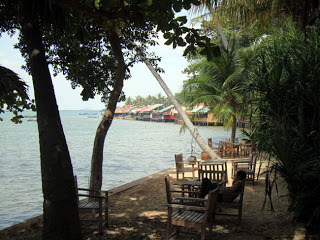
I was feeling very groggy in the morning, so wasn’t able to go, and spent the day in bed. When Neil’s day trip turned into an overnight, late in the afternoon, I got up, feeling slightly better and took a taxi ride to Kep. The journey was quite gruelling - 3 hours on dirt roads in the dark with pot-holes you could put an elephant in! About half way there it began to rain heavily, the second or third time it’s done that since we arrived in Cambodia, despite assurances that this is the dry season - it never rains. But it does now. Apparently the weather is all over the place here too.
Getting to Kep was worth it though. Neil had booked into a guest house in the hills called the Veranda - one of the tourist fictions, but a very welcome treat for a rather bedraggled invalid! For the price of a Travelodge in the UK, we had a suite - sitting/dining room with views out over the rainforest,
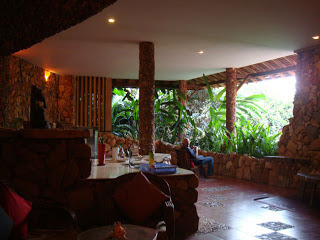
a gigantic bedroom,
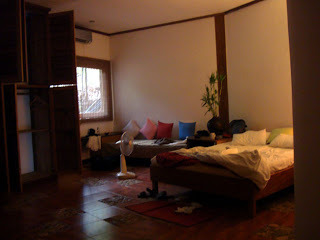
and a bathroom big enough for an entire Khmer family to live in.
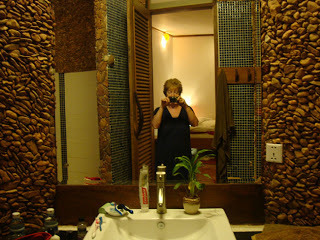 Kep lived up to what we’d been told. Lovely beaches with very few people on them.
Kep lived up to what we’d been told. Lovely beaches with very few people on them.
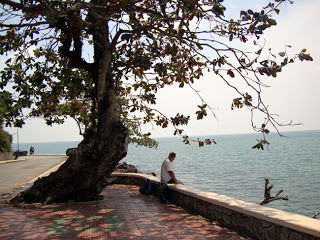 Neil chilling out on the coast It’s clean, picturesque and the seafood cafe’s are safe to eat in - everything caught fresh and cooked immediately. We had fried fish, crab and spicy prawns and it was fantastic.
Neil chilling out on the coast It’s clean, picturesque and the seafood cafe’s are safe to eat in - everything caught fresh and cooked immediately. We had fried fish, crab and spicy prawns and it was fantastic.
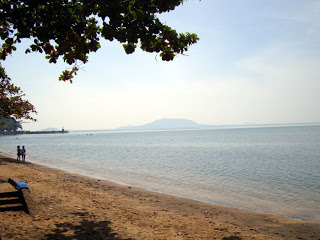 One of the beaches in Kep with Rabbit Island on the horizon
One of the beaches in Kep with Rabbit Island on the horizon
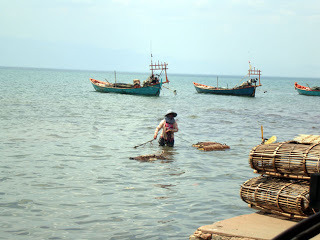 Freshly caught crabs and fish
Freshly caught crabs and fish
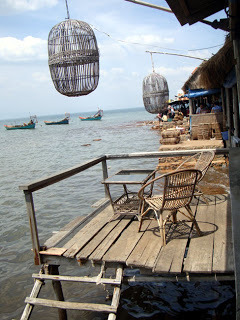 The cafe where we ate themI didn’t want to come back, but we have to move with the family. We’ve definitely marked Kep as an area we want to explore next time we come to Cambodia.
The cafe where we ate themI didn’t want to come back, but we have to move with the family. We’ve definitely marked Kep as an area we want to explore next time we come to Cambodia.
Neil got the opportunity to go to Kep, a very unspoilt fishing village on the coast towards the Vietnamese border. It’s being turned into a tourist destination for rich Khmer, Russians and more middle class Europeans - particularly the French. They are determined it isn’t going to become a back-packers’ destination like Sihanoukville.

I was feeling very groggy in the morning, so wasn’t able to go, and spent the day in bed. When Neil’s day trip turned into an overnight, late in the afternoon, I got up, feeling slightly better and took a taxi ride to Kep. The journey was quite gruelling - 3 hours on dirt roads in the dark with pot-holes you could put an elephant in! About half way there it began to rain heavily, the second or third time it’s done that since we arrived in Cambodia, despite assurances that this is the dry season - it never rains. But it does now. Apparently the weather is all over the place here too.
Getting to Kep was worth it though. Neil had booked into a guest house in the hills called the Veranda - one of the tourist fictions, but a very welcome treat for a rather bedraggled invalid! For the price of a Travelodge in the UK, we had a suite - sitting/dining room with views out over the rainforest,

a gigantic bedroom,

and a bathroom big enough for an entire Khmer family to live in.
 Kep lived up to what we’d been told. Lovely beaches with very few people on them.
Kep lived up to what we’d been told. Lovely beaches with very few people on them. Neil chilling out on the coast It’s clean, picturesque and the seafood cafe’s are safe to eat in - everything caught fresh and cooked immediately. We had fried fish, crab and spicy prawns and it was fantastic.
Neil chilling out on the coast It’s clean, picturesque and the seafood cafe’s are safe to eat in - everything caught fresh and cooked immediately. We had fried fish, crab and spicy prawns and it was fantastic. One of the beaches in Kep with Rabbit Island on the horizon
One of the beaches in Kep with Rabbit Island on the horizon Freshly caught crabs and fish
Freshly caught crabs and fish The cafe where we ate themI didn’t want to come back, but we have to move with the family. We’ve definitely marked Kep as an area we want to explore next time we come to Cambodia.
The cafe where we ate themI didn’t want to come back, but we have to move with the family. We’ve definitely marked Kep as an area we want to explore next time we come to Cambodia.
Published on March 03, 2013 13:00
March 1, 2013
Breeding Seahorses
Things have looked up a bit since the last post. We’ve moved into a small backpackers' guest house, run by an itinerant Irishman and his Cambodian wife, near the beaches where there are restaurants and (sadly!) lots of facilities for Europeans and where it’s much safer to walk around at night. (Don't you just hate being european and middle class!) The Panda costs only 18$US per night and has airconditioning (when the power supply permits) and wi-fi. Renne cooks us nice Khmer food and Patrick does Neil’s eggs and bacon!
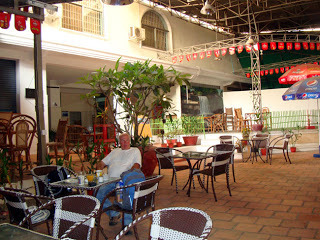
We’re also getting the opportunity to take the children down to the beach every afternoon.
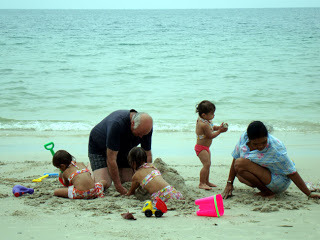 One of the things that Neil’s son is doing in Cambodia is surveying the seahorse population - there are some very rare species here, getting rarer by the minute, as they are in great demand for Chinese medicine.
One of the things that Neil’s son is doing in Cambodia is surveying the seahorse population - there are some very rare species here, getting rarer by the minute, as they are in great demand for Chinese medicine.
Neil’s son, helped by a young marine biologist working for virtually no money, is trying to breed them in tanks so that they can be reintroduced into the wild. It’s a very tricky business, as seahorses are not easy to breed in captivity. They are shy, wild and unusual - virtually the only animal where the male gets pregnant! Dad can pop out several hundred at a time, of which only 1 in a thousand makes it to adulthood. They hope to do better in the tanks.
This is phytoplankton - the bottom of the food chain for the seahorses - they live on tiny, live, shrimp who get fed on the plankton.
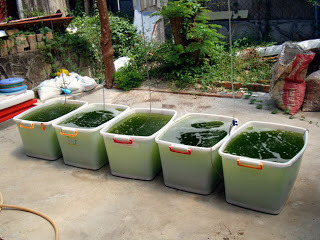
These are babies - but still recognisable.
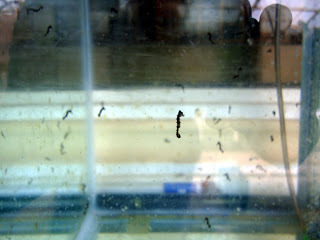
These juveniles are doing very well and beginning to hold on to things.
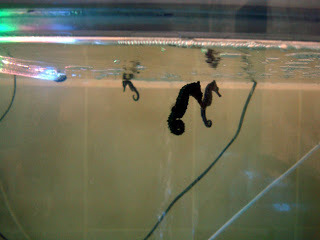
This is a much more grown-up individual. Sea horses take six months to reach sexual maturity - a long time to keep something as fragile as this alive in a tank.
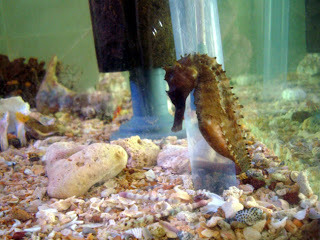
Chinese prosperity seems to be the greatest threat to wildlife at the moment - the demand for rhino horn and dried sea-horse for medicine, as well as the taste for sharks’ fin soup (90% of the sharks in the ocean have already gone) and African ivory is increasing with the expansion of the Chinese economy.

We’re also getting the opportunity to take the children down to the beach every afternoon.
 One of the things that Neil’s son is doing in Cambodia is surveying the seahorse population - there are some very rare species here, getting rarer by the minute, as they are in great demand for Chinese medicine.
One of the things that Neil’s son is doing in Cambodia is surveying the seahorse population - there are some very rare species here, getting rarer by the minute, as they are in great demand for Chinese medicine. Neil’s son, helped by a young marine biologist working for virtually no money, is trying to breed them in tanks so that they can be reintroduced into the wild. It’s a very tricky business, as seahorses are not easy to breed in captivity. They are shy, wild and unusual - virtually the only animal where the male gets pregnant! Dad can pop out several hundred at a time, of which only 1 in a thousand makes it to adulthood. They hope to do better in the tanks.
This is phytoplankton - the bottom of the food chain for the seahorses - they live on tiny, live, shrimp who get fed on the plankton.

These are babies - but still recognisable.

These juveniles are doing very well and beginning to hold on to things.

This is a much more grown-up individual. Sea horses take six months to reach sexual maturity - a long time to keep something as fragile as this alive in a tank.

Chinese prosperity seems to be the greatest threat to wildlife at the moment - the demand for rhino horn and dried sea-horse for medicine, as well as the taste for sharks’ fin soup (90% of the sharks in the ocean have already gone) and African ivory is increasing with the expansion of the Chinese economy.
Published on March 01, 2013 13:00
February 27, 2013
From Paradise to Shit-ville
Things haven’t gone according to plan in Cambodia. We had expected to spend a couple of weeks out on the islands with our grandchildren, doing a bit of snorkelling on the coral reefs, perhaps learning more about diving, playing on the beach with the children and generally chilling out. But, 24 hours later we were back on the mainland.
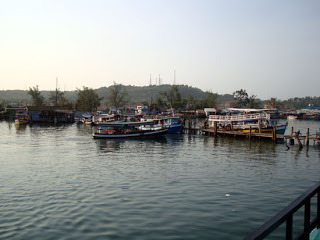 Going to the islandThe first inkling that things were going to be tricky was when the boat approached the village jetty. There was a notice tied to a bamboo pole and three policemen waiting for us. We weren’t going to be allowed to land. After some furious negotiation, the boat was finally allowed to dock and we got off.
Going to the islandThe first inkling that things were going to be tricky was when the boat approached the village jetty. There was a notice tied to a bamboo pole and three policemen waiting for us. We weren’t going to be allowed to land. After some furious negotiation, the boat was finally allowed to dock and we got off.
Eventually we learned what it was all about. There was conflict in the village between pro-conservationists and anti-conservationists. Eco-tourism has given the villagers a taste of the benefits you can get from making money out of tourists and a section of the village want to develop that. Entrepreneurs want to create a resort. Others oppose it and want to keep the status quo. The previous evening Neil’s son had been beaten up in the village bar. He had a broken nose and a lot of bruises. The atmosphere was very tense.
We checked into our palm thatched hut, had an afternoon siesta and watched the sun set in the sea. It was very beautiful. We happily settled in for two weeks of peace and quiet. But the following morning it was decided that it might be safer for Neil’s son to take his wife and children back to the mainland, so we had to go with them on the afternoon boat to Sihanoukhville. It was a very sad little group on the boat.
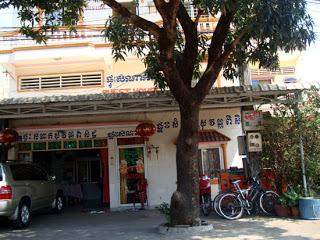
It’s still high season here, so all the reasonably priced ‘european’ hotels near the beach were full and we wanted to be near Neil’s son’s house in order to see the children. So we booked into a Khmer guest house at the ‘wrong’ end of town. This is not touristville - this is the ‘real’ Cambodia that visitors rarely see.
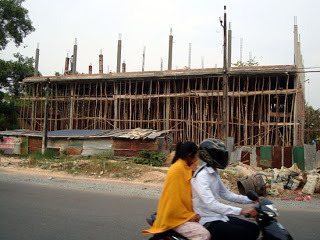 An expanding city. The view opposite our guest house.The guest house costs 15$ US a night, but it’s quiet and clean. The family are very friendly. We have a huge room with two king-size beds and a shower room - though no hot water. There’s nowhere to eat and no wi-fi, so we have to go out for every meal. It’s staggeringly hot and humid.
An expanding city. The view opposite our guest house.The guest house costs 15$ US a night, but it’s quiet and clean. The family are very friendly. We have a huge room with two king-size beds and a shower room - though no hot water. There’s nowhere to eat and no wi-fi, so we have to go out for every meal. It’s staggeringly hot and humid.
This is the laundry - two women with a plastic bowl! It costs 75 cents a kilo.
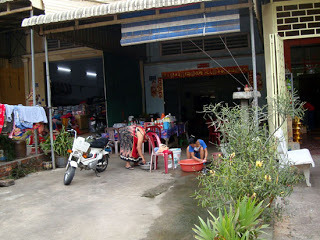
The Boulangerie - the 'Asian Baguettes' are a legacy of French colonial occupation. They are nothing like the French equivalent!
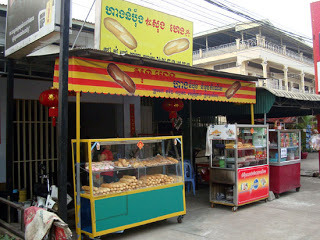
This is the taxi rank.
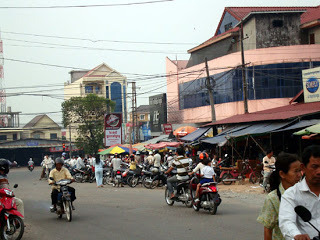
And this is the local filling station - you can buy fuel here by the litre in pepsi cola bottles!
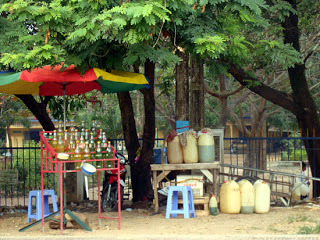
These are the local restaurants and, believe me, you wouldn’t want to eat here unless you had iron-clad intestines!
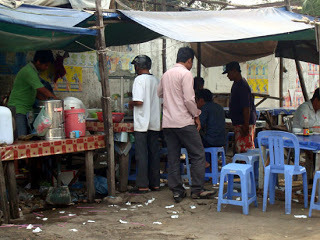
Sihanoukville has got much, much worse in the three years since I’ve been here. The local residents call it Shit-ville - and for a reason. It’s the biggest rubbish dump in the world - there is stinking refuse, food waste (human waste too) and plastic and paper litter everywhere. The rats here live well!
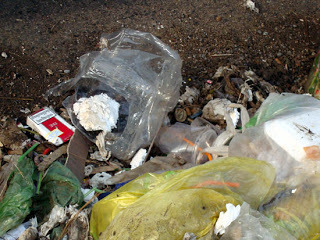
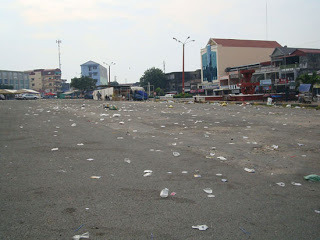 Plastic waste blows everywhere Add to that rolling power cuts that last for hours every day and life can be difficult. Almost every business has it’s own generator to run essential services (though not the airconditioning). You simply have to if you want to stay in business. As the tourist industry has expanded here so has the demand for electricity. Apparently a Chinese, coal-fired, power station is being built but is months behind schedule and god knows what it will do to the atmosphere when it’s finally commissioned.
Plastic waste blows everywhere Add to that rolling power cuts that last for hours every day and life can be difficult. Almost every business has it’s own generator to run essential services (though not the airconditioning). You simply have to if you want to stay in business. As the tourist industry has expanded here so has the demand for electricity. Apparently a Chinese, coal-fired, power station is being built but is months behind schedule and god knows what it will do to the atmosphere when it’s finally commissioned.
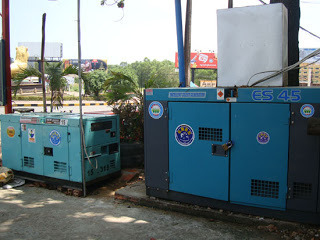
This is what the third world looks like. If you stay in one of the resorts - what I call ‘Tourist Fictions’, you won’t see it. I confess that I’m well out of my comfort zone - what I see on the streets every day makes my stomach churn, but this is the reality of life for a large sector of the world’s population and it makes me feel guilty for the privileges I take for granted. And guilty for enjoying a life-style that's ruining the planet.
 Going to the islandThe first inkling that things were going to be tricky was when the boat approached the village jetty. There was a notice tied to a bamboo pole and three policemen waiting for us. We weren’t going to be allowed to land. After some furious negotiation, the boat was finally allowed to dock and we got off.
Going to the islandThe first inkling that things were going to be tricky was when the boat approached the village jetty. There was a notice tied to a bamboo pole and three policemen waiting for us. We weren’t going to be allowed to land. After some furious negotiation, the boat was finally allowed to dock and we got off. Eventually we learned what it was all about. There was conflict in the village between pro-conservationists and anti-conservationists. Eco-tourism has given the villagers a taste of the benefits you can get from making money out of tourists and a section of the village want to develop that. Entrepreneurs want to create a resort. Others oppose it and want to keep the status quo. The previous evening Neil’s son had been beaten up in the village bar. He had a broken nose and a lot of bruises. The atmosphere was very tense.
We checked into our palm thatched hut, had an afternoon siesta and watched the sun set in the sea. It was very beautiful. We happily settled in for two weeks of peace and quiet. But the following morning it was decided that it might be safer for Neil’s son to take his wife and children back to the mainland, so we had to go with them on the afternoon boat to Sihanoukhville. It was a very sad little group on the boat.

It’s still high season here, so all the reasonably priced ‘european’ hotels near the beach were full and we wanted to be near Neil’s son’s house in order to see the children. So we booked into a Khmer guest house at the ‘wrong’ end of town. This is not touristville - this is the ‘real’ Cambodia that visitors rarely see.
 An expanding city. The view opposite our guest house.The guest house costs 15$ US a night, but it’s quiet and clean. The family are very friendly. We have a huge room with two king-size beds and a shower room - though no hot water. There’s nowhere to eat and no wi-fi, so we have to go out for every meal. It’s staggeringly hot and humid.
An expanding city. The view opposite our guest house.The guest house costs 15$ US a night, but it’s quiet and clean. The family are very friendly. We have a huge room with two king-size beds and a shower room - though no hot water. There’s nowhere to eat and no wi-fi, so we have to go out for every meal. It’s staggeringly hot and humid. This is the laundry - two women with a plastic bowl! It costs 75 cents a kilo.

The Boulangerie - the 'Asian Baguettes' are a legacy of French colonial occupation. They are nothing like the French equivalent!

This is the taxi rank.

And this is the local filling station - you can buy fuel here by the litre in pepsi cola bottles!

These are the local restaurants and, believe me, you wouldn’t want to eat here unless you had iron-clad intestines!

Sihanoukville has got much, much worse in the three years since I’ve been here. The local residents call it Shit-ville - and for a reason. It’s the biggest rubbish dump in the world - there is stinking refuse, food waste (human waste too) and plastic and paper litter everywhere. The rats here live well!

 Plastic waste blows everywhere Add to that rolling power cuts that last for hours every day and life can be difficult. Almost every business has it’s own generator to run essential services (though not the airconditioning). You simply have to if you want to stay in business. As the tourist industry has expanded here so has the demand for electricity. Apparently a Chinese, coal-fired, power station is being built but is months behind schedule and god knows what it will do to the atmosphere when it’s finally commissioned.
Plastic waste blows everywhere Add to that rolling power cuts that last for hours every day and life can be difficult. Almost every business has it’s own generator to run essential services (though not the airconditioning). You simply have to if you want to stay in business. As the tourist industry has expanded here so has the demand for electricity. Apparently a Chinese, coal-fired, power station is being built but is months behind schedule and god knows what it will do to the atmosphere when it’s finally commissioned.
This is what the third world looks like. If you stay in one of the resorts - what I call ‘Tourist Fictions’, you won’t see it. I confess that I’m well out of my comfort zone - what I see on the streets every day makes my stomach churn, but this is the reality of life for a large sector of the world’s population and it makes me feel guilty for the privileges I take for granted. And guilty for enjoying a life-style that's ruining the planet.
Published on February 27, 2013 23:29
February 25, 2013
Tuesday Poem: DH Lawrence and a Whale’s Tail
They say the sea is cold, but the sea contains
the hottest blood of all, and the wildest, the most urgent.
All the whales in the wider deeps, hot are they, as they urge
on an on, and dive beneath the icebergs.
The right whales, the sperm-whales, the hammer-heads, the killers
there they blow, there they blow, hot wild white breath out of the sea.
And they rock, and they rock, through the sensual ageless ages
on the depths of the seven seas,
and through the salt they reel with drunk delight
and in the tropics tremble they with love
and roll with massive, strong desire, like gods.
DH Lawrence, Whales Weep Not
To read the whole poem - click here.
In 1922 DH Lawrence and his wife Frieda found themselves in Wellington, New Zealand, and they sent Katherine Mansfield a post card of two Maori in bush to remind her of her homeland. ‘We thought very hard of you here!’ Frieda wrote, mending an estrangement that had lasted for years, ever since DHL had sent a letter telling KM to rot in her own tuberculosis. Miraculously, she forgave him.
Somewhere on his visit to the southern hemisphere DH must have seen the whales that pass on their migration routes every year, north from the antarctic, and then south on a long pilgrimage to breed and feed. New Zealand is regularly visited by the southern Right Whale, Humpbacks, Blue whales and Orca, and the 3,000 metre deep trench off the Pacific coast is home to a number of bachelor Sperm whales who feed on the giant squid that lurk in the darkness. Squid specimens up to 33 metres long have been found by fishermen - one only the day before we went out in the whale boats at Kaikoura, on our way back to Christchurch.
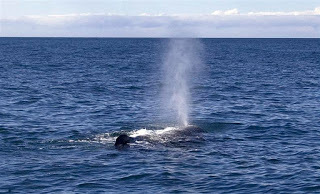
This is Tutu, a 50 ton Sperm whale who obliged us with a view of his ‘wild white breath’ twice on the same morning. And two separate displays of his tail.
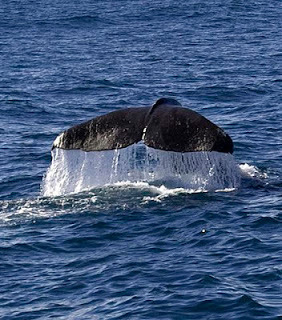
I like to think that DH Lawrence and Frieda shared a similar experience.
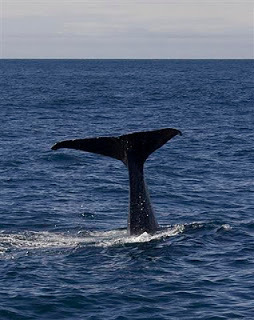
Published on February 25, 2013 15:30
February 23, 2013
Wellington and the Katherine Mansfield Conference
I’m in Cambodia at the moment, but things aren’t going exactly to plan - so (sadly) I’m not on the island for reasons I can’t write about yet.
Camped out in a back-packers’ hostel in Sihanoukhville (not the best experience) and fondly remembering Wellington and the Katherine Mansfield Conference, which now seems very remote and civilised in comparison to what’s around me here! Wellington is a fantastic city. We had three wonderful days of packed activity and intense discussions carried on over some great meals
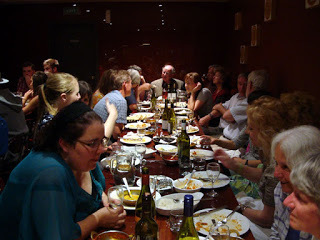 before a final dinner as guests of the Minister for Culture in the NZ Parliament building.
before a final dinner as guests of the Minister for Culture in the NZ Parliament building.
Neil and I were staying in the historic Shepherd’s Arms on Tinakori Road close to the house where Katherine was born, and walked every morning over to the university through the Botanic Gardens. They are very beautiful and the views of the city and the harbour are genuinely breathtaking. We got lost walking back on the first night we were there and ended up stumbling around in the dark gardens at midnight trying to find a way out!
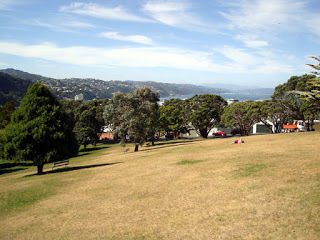 Botanic Gardens at ThorndenA highlight of the conference was the New Zealand launch of a new collected edition of the complete stories of Katherine Mansfield - including some recent discoveries. It’s a very impressive piece of work, edited by Professor Vincent O’Sullivan (himself a fine writer) and KM scholar Gerri Kimber. This is the Edinburgh University Press editor Jackie Jones with Vincent at the Parliamentary dinner.
Botanic Gardens at ThorndenA highlight of the conference was the New Zealand launch of a new collected edition of the complete stories of Katherine Mansfield - including some recent discoveries. It’s a very impressive piece of work, edited by Professor Vincent O’Sullivan (himself a fine writer) and KM scholar Gerri Kimber. This is the Edinburgh University Press editor Jackie Jones with Vincent at the Parliamentary dinner.
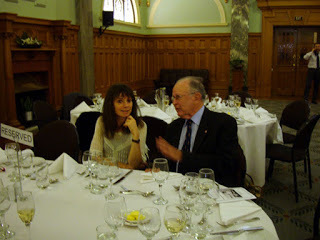
Another highlight was a performance of cello music by one of New Zealand’s earliest composers - Arnold Trowell - the twin brother of Garnett, who was the father of Katherine’s illegitimate baby.
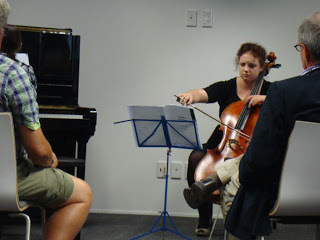 It was very exciting for me to be able to have another look at the Katherine Mansfield manuscripts previously owned by the family of John Middleton Murry. Last time I saw them they were in storage boxes and it was a great privilege to be allowed access to them for the biography. I was also able to draw up a rough catalogue for the family to help them decide what to do with the collection. I’m so happy that they chose the Alexander Turnbull Library as the best resting place for these precious papers - it was very pleasing to see how much they are valued there. This is just some of the manuscripts being shown off with pride to delegates at the conference.
It was very exciting for me to be able to have another look at the Katherine Mansfield manuscripts previously owned by the family of John Middleton Murry. Last time I saw them they were in storage boxes and it was a great privilege to be allowed access to them for the biography. I was also able to draw up a rough catalogue for the family to help them decide what to do with the collection. I’m so happy that they chose the Alexander Turnbull Library as the best resting place for these precious papers - it was very pleasing to see how much they are valued there. This is just some of the manuscripts being shown off with pride to delegates at the conference.
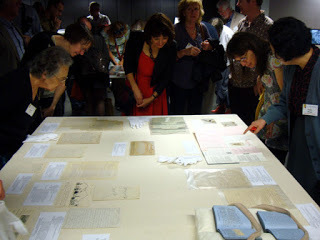
One of my favourites is Katherine’s passport - a sad record of how many times she changed countries in the last couple of years of her life in her desperate search for health.
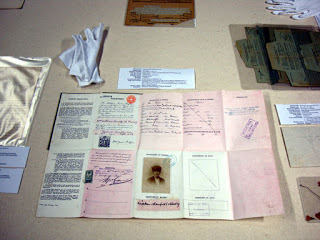
We tried to stay on in Wellington for an extra day to fit in all the things we hadn’t managed to do while we were there, but the hotel couldn’t give us another night. So we decided to go back to Christchurch via ferry and train, slipping out of the harbour on a cloudy Monday morning aboard the Kaitaki, which used to be a cross-channel ferry called the Pride of Cherbourg and is now plying the Cook Strait instead! I felt quite sad as I watched the city disappear over the horizon and wondered when I'd manage to get back there again.
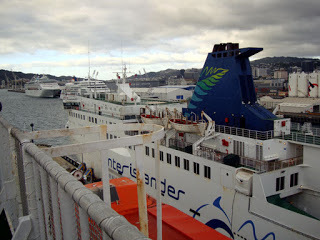
Camped out in a back-packers’ hostel in Sihanoukhville (not the best experience) and fondly remembering Wellington and the Katherine Mansfield Conference, which now seems very remote and civilised in comparison to what’s around me here! Wellington is a fantastic city. We had three wonderful days of packed activity and intense discussions carried on over some great meals
 before a final dinner as guests of the Minister for Culture in the NZ Parliament building.
before a final dinner as guests of the Minister for Culture in the NZ Parliament building.Neil and I were staying in the historic Shepherd’s Arms on Tinakori Road close to the house where Katherine was born, and walked every morning over to the university through the Botanic Gardens. They are very beautiful and the views of the city and the harbour are genuinely breathtaking. We got lost walking back on the first night we were there and ended up stumbling around in the dark gardens at midnight trying to find a way out!
 Botanic Gardens at ThorndenA highlight of the conference was the New Zealand launch of a new collected edition of the complete stories of Katherine Mansfield - including some recent discoveries. It’s a very impressive piece of work, edited by Professor Vincent O’Sullivan (himself a fine writer) and KM scholar Gerri Kimber. This is the Edinburgh University Press editor Jackie Jones with Vincent at the Parliamentary dinner.
Botanic Gardens at ThorndenA highlight of the conference was the New Zealand launch of a new collected edition of the complete stories of Katherine Mansfield - including some recent discoveries. It’s a very impressive piece of work, edited by Professor Vincent O’Sullivan (himself a fine writer) and KM scholar Gerri Kimber. This is the Edinburgh University Press editor Jackie Jones with Vincent at the Parliamentary dinner.
Another highlight was a performance of cello music by one of New Zealand’s earliest composers - Arnold Trowell - the twin brother of Garnett, who was the father of Katherine’s illegitimate baby.
 It was very exciting for me to be able to have another look at the Katherine Mansfield manuscripts previously owned by the family of John Middleton Murry. Last time I saw them they were in storage boxes and it was a great privilege to be allowed access to them for the biography. I was also able to draw up a rough catalogue for the family to help them decide what to do with the collection. I’m so happy that they chose the Alexander Turnbull Library as the best resting place for these precious papers - it was very pleasing to see how much they are valued there. This is just some of the manuscripts being shown off with pride to delegates at the conference.
It was very exciting for me to be able to have another look at the Katherine Mansfield manuscripts previously owned by the family of John Middleton Murry. Last time I saw them they were in storage boxes and it was a great privilege to be allowed access to them for the biography. I was also able to draw up a rough catalogue for the family to help them decide what to do with the collection. I’m so happy that they chose the Alexander Turnbull Library as the best resting place for these precious papers - it was very pleasing to see how much they are valued there. This is just some of the manuscripts being shown off with pride to delegates at the conference.
One of my favourites is Katherine’s passport - a sad record of how many times she changed countries in the last couple of years of her life in her desperate search for health.

We tried to stay on in Wellington for an extra day to fit in all the things we hadn’t managed to do while we were there, but the hotel couldn’t give us another night. So we decided to go back to Christchurch via ferry and train, slipping out of the harbour on a cloudy Monday morning aboard the Kaitaki, which used to be a cross-channel ferry called the Pride of Cherbourg and is now plying the Cook Strait instead! I felt quite sad as I watched the city disappear over the horizon and wondered when I'd manage to get back there again.

Published on February 23, 2013 05:05
February 18, 2013
A Brief Blog-break!
I am currently in Cambodia, on a remote island without internet access. A retreat from the world of technology, blogging, tweeting and googling. I will be back on the 2nd of March, but will pop up a postcard or two if I get the chance of a visit to civilisation!
Paradise looks like this:
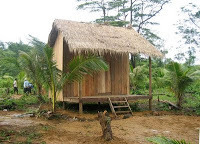 and this:
and this:
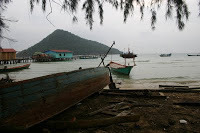
Paradise looks like this:
 and this:
and this:
Published on February 18, 2013 15:30
February 16, 2013
Wonderful Windy Wellington!
A brief return to Christchurch, playing with my lovely grandsons, and then off to Wellington for the Katherine Mansfield Conference. It's called 'Masked and Unmasked' and concentrates on Katherine's love of playing parts - not just in her fiction. Katherine changed her name frequently when she was young, experimenting with different identities. She once wrote to a friend that sometimes she felt like the proprietor of a small hotel, giving out keys to all the guests!
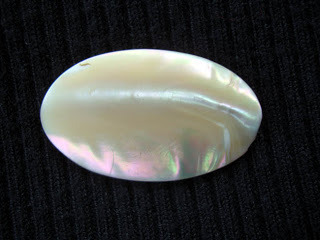 KM's mother of pearl brooch One of the reasons to be here is also to hand over the Katherine Mansfield mother-of-pearl brooch that I was given when I first started the research for the book. It's acted like a talisman; every time I was tempted to give up, it looked at me from the drawer and made giving up impossible. While I had it, I had to write the biography. The gift created an obligation. But the book is written and out in the world now and I don't feel comfortable being in possession of such a valuable and historic object - it would also have to be sold when I die, as I have four children. So I felt that the right thing to do was to hand it over to a museum in New Zealand that would look after it properly. I chose the
Katherine Mansfield Birthplace Trust
, because they are willing to put it on display, rather than just show it to people who come along and ask. It will be accessible to the general public, in the house on Tinakori Road where Katherine was born, and I like that.
KM's mother of pearl brooch One of the reasons to be here is also to hand over the Katherine Mansfield mother-of-pearl brooch that I was given when I first started the research for the book. It's acted like a talisman; every time I was tempted to give up, it looked at me from the drawer and made giving up impossible. While I had it, I had to write the biography. The gift created an obligation. But the book is written and out in the world now and I don't feel comfortable being in possession of such a valuable and historic object - it would also have to be sold when I die, as I have four children. So I felt that the right thing to do was to hand it over to a museum in New Zealand that would look after it properly. I chose the
Katherine Mansfield Birthplace Trust
, because they are willing to put it on display, rather than just show it to people who come along and ask. It will be accessible to the general public, in the house on Tinakori Road where Katherine was born, and I like that.
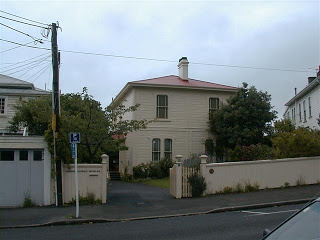
The next thing was to meet a group of Tuesday Poets who live in Wellington - a great evening in the Library Bar! I'd met Tim Jones and Mary McCallum before, but it was the first time for Janis Freegard , Harvey Molloy and Helen Rickerby (who has just posted a Katherine Mansfield poem!).
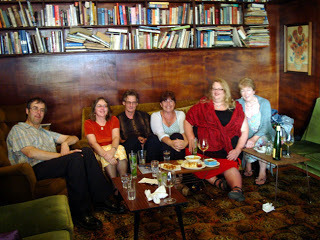 Tim Jones, Janis Freegard, Harvey Molloy, Mary McCallum, Helen Rickerby, and me. I had a lovely time - and that was only Day One! We got rather lost finding our way back to our room on Tinakori Road later on and were wandering around the Botanic Gardens, trying to find a way out, at midnight because we didn't have a map of Wellington. Something for tomorrow!
Tim Jones, Janis Freegard, Harvey Molloy, Mary McCallum, Helen Rickerby, and me. I had a lovely time - and that was only Day One! We got rather lost finding our way back to our room on Tinakori Road later on and were wandering around the Botanic Gardens, trying to find a way out, at midnight because we didn't have a map of Wellington. Something for tomorrow!
 KM's mother of pearl brooch One of the reasons to be here is also to hand over the Katherine Mansfield mother-of-pearl brooch that I was given when I first started the research for the book. It's acted like a talisman; every time I was tempted to give up, it looked at me from the drawer and made giving up impossible. While I had it, I had to write the biography. The gift created an obligation. But the book is written and out in the world now and I don't feel comfortable being in possession of such a valuable and historic object - it would also have to be sold when I die, as I have four children. So I felt that the right thing to do was to hand it over to a museum in New Zealand that would look after it properly. I chose the
Katherine Mansfield Birthplace Trust
, because they are willing to put it on display, rather than just show it to people who come along and ask. It will be accessible to the general public, in the house on Tinakori Road where Katherine was born, and I like that.
KM's mother of pearl brooch One of the reasons to be here is also to hand over the Katherine Mansfield mother-of-pearl brooch that I was given when I first started the research for the book. It's acted like a talisman; every time I was tempted to give up, it looked at me from the drawer and made giving up impossible. While I had it, I had to write the biography. The gift created an obligation. But the book is written and out in the world now and I don't feel comfortable being in possession of such a valuable and historic object - it would also have to be sold when I die, as I have four children. So I felt that the right thing to do was to hand it over to a museum in New Zealand that would look after it properly. I chose the
Katherine Mansfield Birthplace Trust
, because they are willing to put it on display, rather than just show it to people who come along and ask. It will be accessible to the general public, in the house on Tinakori Road where Katherine was born, and I like that.
The next thing was to meet a group of Tuesday Poets who live in Wellington - a great evening in the Library Bar! I'd met Tim Jones and Mary McCallum before, but it was the first time for Janis Freegard , Harvey Molloy and Helen Rickerby (who has just posted a Katherine Mansfield poem!).
 Tim Jones, Janis Freegard, Harvey Molloy, Mary McCallum, Helen Rickerby, and me. I had a lovely time - and that was only Day One! We got rather lost finding our way back to our room on Tinakori Road later on and were wandering around the Botanic Gardens, trying to find a way out, at midnight because we didn't have a map of Wellington. Something for tomorrow!
Tim Jones, Janis Freegard, Harvey Molloy, Mary McCallum, Helen Rickerby, and me. I had a lovely time - and that was only Day One! We got rather lost finding our way back to our room on Tinakori Road later on and were wandering around the Botanic Gardens, trying to find a way out, at midnight because we didn't have a map of Wellington. Something for tomorrow!
Published on February 16, 2013 15:30



